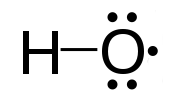Hydroxyl radical
Highly reactive species in chemistry
Hydroxyl Radical[edit | edit source]
The hydroxyl radical (•OH) is a highly reactive species in chemistry, known for its role in various chemical and biological processes. It is a neutral form of the hydroxide ion (OH_) and is one of the most reactive free radicals. Hydroxyl radicals are often involved in oxidation reactions and are crucial in atmospheric chemistry, particularly in the degradation of pollutants.
Formation[edit | edit source]
Hydroxyl radicals are typically formed through the photolysis of water vapor in the atmosphere, a process driven by ultraviolet (UV) radiation. This can be represented by the following reaction:
- H_O + UV _ •OH + H•
In addition to photolysis, hydroxyl radicals can also be generated through the reaction of ozone (O_) with water vapor or through the Fenton reaction, where hydrogen peroxide (H_O_) reacts with iron ions (Fe__):
- H_O_ + Fe__ _ •OH + OH_ + Fe__
Reactivity[edit | edit source]
The hydroxyl radical is extremely reactive due to its unpaired electron, making it a potent oxidizing agent. It can react with a wide range of organic and inorganic substances, often initiating chain reactions. In the atmosphere, hydroxyl radicals play a critical role in the breakdown of pollutants such as volatile organic compounds (VOCs) and nitrogen oxides (NOx), contributing to the formation of secondary pollutants like ozone.
Biological Significance[edit | edit source]
In biological systems, hydroxyl radicals are produced as byproducts of normal metabolic processes. They are part of the reactive oxygen species (ROS) family, which includes superoxide anions (O__) and hydrogen peroxide (H_O_). While ROS are essential for certain cellular functions, excessive production of hydroxyl radicals can lead to oxidative stress, damaging cellular components such as DNA, proteins, and lipids.
Environmental Impact[edit | edit source]
Hydroxyl radicals are often referred to as the "atmosphere's detergent" due to their ability to cleanse the air of pollutants. They react with methane and other greenhouse gases, influencing the atmospheric lifetime of these compounds. This reactivity is crucial for maintaining the balance of atmospheric chemistry and mitigating the effects of air pollution.
Applications[edit | edit source]
In industrial and environmental applications, hydroxyl radicals are utilized in advanced oxidation processes (AOPs) for water and wastewater treatment. These processes involve generating hydroxyl radicals to degrade organic contaminants, making them an effective method for purifying water.
Related Pages[edit | edit source]
Transform your life with W8MD's budget GLP1 injections from $125
W8MD offers a medical weight loss program NYC and a clinic to lose weight in Philadelphia. Our W8MD's physician supervised medical weight loss centers in NYC provides expert medical guidance, and offers telemedicine options for convenience.
Why choose W8MD?
- Comprehensive care with FDA-approved weight loss medications including:
- loss injections in NYC both generic and brand names:
- weight loss medications including Phentermine, Qsymia, Diethylpropion etc.
- Accept most insurances for visits or discounted self pay cost.
- Generic weight loss injections starting from just $125.00 for the starting dose
- In person weight loss NYC and telemedicine medical weight loss options in New York city available
- Budget GLP1 weight loss injections in NYC starting from $125.00 biweekly with insurance!
Book Your Appointment
Start your NYC weight loss journey today at our NYC medical weight loss, and Philadelphia medical weight loss Call (718)946-5500 for NY and 215 676 2334 for PA
Search WikiMD
Ad.Tired of being Overweight? Try W8MD's NYC physician weight loss.
Semaglutide (Ozempic / Wegovy and Tirzepatide (Mounjaro / Zepbound) available. Call 718 946 5500.
Advertise on WikiMD
|
WikiMD's Wellness Encyclopedia |
| Let Food Be Thy Medicine Medicine Thy Food - Hippocrates |
Translate this page: - East Asian
中文,
日本,
한국어,
South Asian
हिन्दी,
தமிழ்,
తెలుగు,
Urdu,
ಕನ್ನಡ,
Southeast Asian
Indonesian,
Vietnamese,
Thai,
မြန်မာဘာသာ,
বাংলা
European
español,
Deutsch,
français,
Greek,
português do Brasil,
polski,
română,
русский,
Nederlands,
norsk,
svenska,
suomi,
Italian
Middle Eastern & African
عربى,
Turkish,
Persian,
Hebrew,
Afrikaans,
isiZulu,
Kiswahili,
Other
Bulgarian,
Hungarian,
Czech,
Swedish,
മലയാളം,
मराठी,
ਪੰਜਾਬੀ,
ગુજરાતી,
Portuguese,
Ukrainian
Medical Disclaimer: WikiMD is not a substitute for professional medical advice. The information on WikiMD is provided as an information resource only, may be incorrect, outdated or misleading, and is not to be used or relied on for any diagnostic or treatment purposes. Please consult your health care provider before making any healthcare decisions or for guidance about a specific medical condition. WikiMD expressly disclaims responsibility, and shall have no liability, for any damages, loss, injury, or liability whatsoever suffered as a result of your reliance on the information contained in this site. By visiting this site you agree to the foregoing terms and conditions, which may from time to time be changed or supplemented by WikiMD. If you do not agree to the foregoing terms and conditions, you should not enter or use this site. See full disclaimer.
Credits:Most images are courtesy of Wikimedia commons, and templates, categories Wikipedia, licensed under CC BY SA or similar.
Contributors: Prab R. Tumpati, MD




